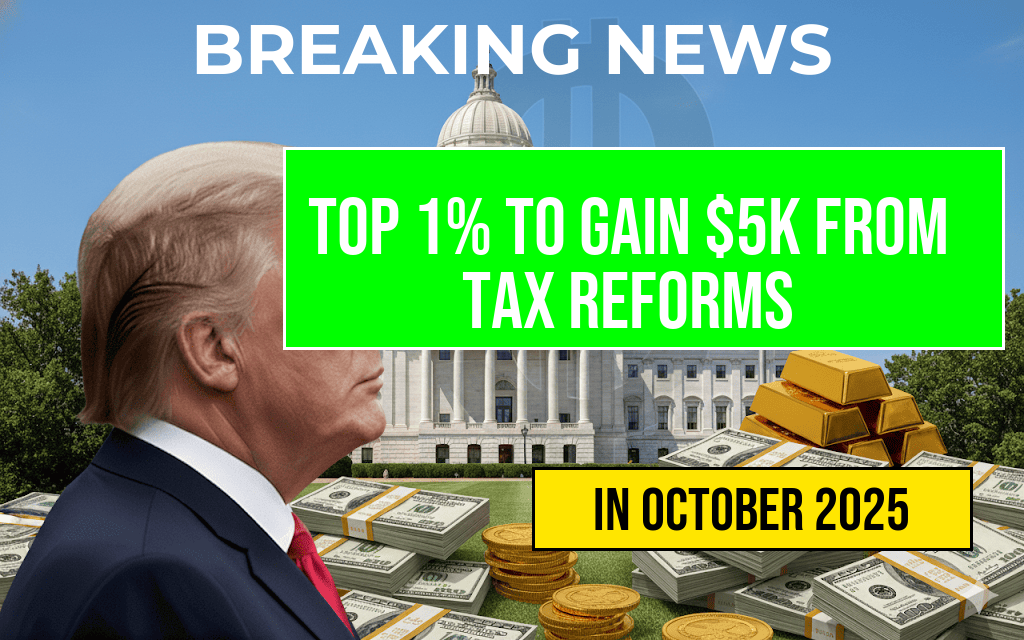Under recent tax reforms enacted by Congress, the wealthiest Americans in the top 1% are projected to see an average net income increase of approximately $5,000. This shift is driven by changes in tax brackets, adjustments to capital gains taxes, and increased deductions that predominantly benefit high-net-worth individuals. While the overall economic impact of the reforms remains debated, data suggests that those with the highest income levels will experience the most significant immediate financial gains. The reforms aim to simplify certain tax provisions and encourage investment, but critics argue they may exacerbate income inequality. As policymakers and analysts scrutinize the long-term effects, understanding the specific mechanisms behind these gains becomes crucial for assessing broader economic implications.
Details of the Tax Reforms and Their Impact on the Wealthiest Americans
Key Provisions Favoring High-Income Earners
- Adjusted Capital Gains Tax Rates: The reform introduced a tiered structure that reduces capital gains taxes for those in the highest income brackets, allowing some to pay less on investment profits.
- Increased Standard Deduction and Itemized Deductions: Higher thresholds for deductions benefit wealthy taxpayers who typically itemize extensively.
- Changes in Estate and Gift Tax Regulations: Modifications to estate taxes may allow wealth transfer with lower liabilities, preserving wealth within families.
Quantifying the Gains
| Income Bracket | Average Net Income Increase | Percentage Increase |
|---|---|---|
| $1 million – $5 million | $4,800 | 2.1% |
| $5 million – $20 million | $5,300 | 1.8% |
| Over $20 million | $5,700 | 1.5% |
This table highlights that the greatest gains are concentrated among the ultra-wealthy, with those at the very top seeing the highest dollar increase, primarily due to favorable treatment of investments and estate planning provisions.
Implications for Income Inequality and Economic Policy
Debate Over Fiscal Fairness
Supporters argue that these reforms incentivize investment, entrepreneurship, and economic growth, which could benefit broader society through job creation and innovation. They contend that targeted tax relief for high earners can stimulate the economy by enabling wealth to be reinvested into businesses and markets.
Conversely, critics emphasize that such benefits may widen existing income gaps. Income inequality in the U.S. remains a pressing concern, with experts warning that preferential treatment for the wealthy could undermine efforts to promote equitable growth and social mobility.
Potential Long-Term Effects
Economists are divided on whether these tax changes will lead to sustainable economic benefits or merely augment the wealth concentration at the top. Some studies suggest that excessive tax advantages for the wealthy can lead to reduced public revenue, impacting funding for public services and infrastructure. Others highlight that strategic tax planning and reforms can foster an environment conducive to innovation and capital formation.
Expert Perspectives and Future Outlook
Analyst Insights
Financial analysts from institutions like Forbes note that the actual net income gains depend heavily on individual circumstances, such as investment portfolios and estate plans. Forbes highlights that while the average gain is around $5,000, some taxpayers may see much larger increases due to their specific financial structures.
Policy Developments to Watch
Looking ahead, policymakers may revisit certain provisions as economic conditions evolve. Discussions around adjusting capital gains taxes and estate taxes continue to generate debate, with some advocating for more progressive reforms to address wealth disparities. The impact of these changes on the overall economy and federal revenue remains an area of active analysis.
Summary
The recent tax reforms are expected to provide the wealthiest Americans with an average net income boost of about $5,000. While intended to promote investment and economic growth, these benefits predominantly favor those at the very top of the income spectrum, raising questions about long-term equity and fiscal sustainability. As the reforms take effect, both supporters and critics are closely monitoring their implications for income distribution and overall economic health, emphasizing the importance of balanced policy approaches in addressing America’s complex fiscal landscape.
Frequently Asked Questions
What is the main impact of recent tax reforms on the wealthiest Americans?
The recent tax reforms are expected to increase the net income of the wealthiest Americans in the Top 1% by approximately $5,000.
How will the additional income benefit the top 1% of earners?
The additional $5,000 in net income can enhance the financial stability and investment opportunities for the wealthiest Americans, potentially leading to further wealth accumulation.
Which groups are primarily affected by these tax reforms?
The top 1% of Americans, typically those with the highest incomes and wealth, are the primary beneficiaries of these tax reforms.
Are the tax reforms expected to have broader economic effects?
While the reforms benefit the wealthiest Americans financially, their overall impact on the economy includes potential shifts in investment, spending, and income distribution.
When did these changes in net income occur, and are they ongoing?
The projected $5,000 increase in net income is based on recent tax reforms and may continue to evolve as policies are implemented and adjusted over time.






